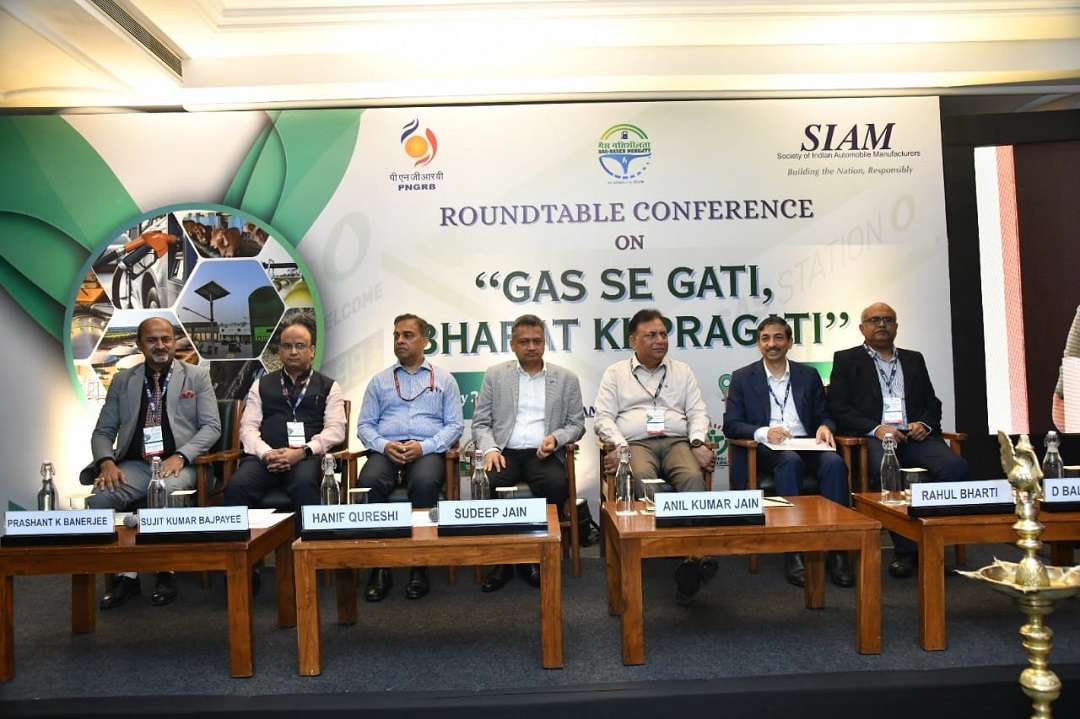The Society of Indian Automobile Manufacturers (SIAM), in collaboration with the Petroleum and Natural Gas Regulatory Board (PNGRB), hosted a landmark roundtable titled “Gas se Gati, Bharat ki Pragati” at the India Habitat Centre in New Delhi. The event brought together government officials, industry leaders, and experts to explore the role of gas-based mobility — including Compressed Natural Gas (CNG), Compressed Bio-Gas (CBG), and Liquefied Natural Gas (LNG) — in advancing sustainable urban and long-distance transportation across India. This discussion is part of SIAM’s Gas Mobility initiative, aimed at promoting the adoption of clean and efficient gas-based mobility solutions in the country.
Opening the event, Prashant K Banerjee, Executive Director of SIAM, emphasized India’s leadership in gas-fuelled transportation. “India is already the largest user of gas-based fuels in the mobility sector globally. Our journey began with CNG adoption for cars, and today, India boasts the largest fleet of gas-powered buses and three-wheelers. The launch of the world’s first CNG two-wheeler last year marked another milestone in this journey,” he said.
Dr Hanif Qureshi, Additional Secretary at the Ministry of Heavy Industries, highlighted the role of India’s $240 billion automobile industry in achieving carbon neutrality by 2047. “Gas-based mobility, backed by the PLI scheme, is pivotal for reducing fossil fuel dependency and advancing towards a self-reliant future under Atmanirbhar Bharat,” he added.
Saudeep Jain, Additional Secretary at the Ministry of New and Renewable Energy, underscored the importance of Compressed Bio-Gas (CBG) in tackling air pollution and promoting rural prosperity. “By converting agricultural waste into CBG, we can both curb pollution and reduce our dependence on oil imports,” he noted, adding that India’s auto OEMs could play a crucial role in building a global hub for green vehicles.
Rahul Bharti, Senior Executive Director at Maruti Suzuki, spoke about the role of the transport sector in India’s energy transition. “With government support, we are on track to install nearly 10,000 CNG stations by 2025. The increased adoption of Compressed Biogas (CBG) is transforming rural infrastructure, benefiting farmers and the environment,” he said.
Dr Sujit Kumar Bajpayee, a member of the Commission for Air Quality Management (CAQM), highlighted the pressing need for cleaner alternatives in Delhi NCR, stating, “Gas-based mobility is not just a choice, but a necessity to address pollution in India’s most affected regions.”
Dr Anil Kumar Jain, Chairperson of PNGRB, delivered the keynote address, affirming India’s progress in the energy transition. “The growing adoption of CNG as a transition fuel is a success story we must build on, ensuring gas-based mobility plays a significant role in India’s sustainable future,” he stated.
The session titled “Accelerating Future Growth and Promoting Gas-Based Mobility” was chaired by Ved Prakash Mishra, Joint Secretary at the Ministry of Environment, Forest & Climate Change. He stressed that until the transition to electric vehicles (EVs) is complete, gas will continue to be a vital part of the solution. “CNG adoption in Delhi has already resulted in significant improvements in air quality, and gas-based mobility remains key to achieving a cleaner, more sustainable future,” Mr Mishra said.
Dr Mukesh Sharma from IIT Kanpur presented findings that demonstrated the substantial air quality benefits of transitioning to CNG vehicles, noting a 90-95% reduction in PM emissions with the use of CNG.
During the panel discussion on “Fuelling the Shift: CBG & LNG for Today’s Mobility and Beyond”,. Venugopal Mothkoor, Senior Specialist at NITI Aayog, explained that CBG and LNG are crucial to meeting India’s growing transport demands while achieving net-zero emissions by 2070. “NITI Aayog’s roadmap to net-zero includes LNG and electric trucks, and while electric vehicle infrastructure grows, LNG will remain critical for transport,”Mr Mothkoor explained.
Other notable panelists included Rajesh Khanna from Tata Motors, Goutom Chakraborty from GAIL Gas, and Kamal Kishore Chatiwal from Indraprastha Gas Ltd., who discussed the growth potential of gas-based mobility and the future of India’s transportation sector.
In his closing remarks, Ashish Chutani, Chairman of SIAM Gas-Based Mobility Group, reiterated SIAM and PNGRB’s commitment to making gas-based mobility a cornerstone of India’s sustainable transportation ecosystem. The conference underscored the growing role of CNG, CBG, and LNG as solutions to reduce carbon emissions, improve air quality, and ensure a cleaner, greener future for India’s transport sector.







